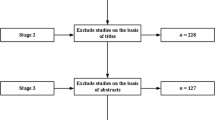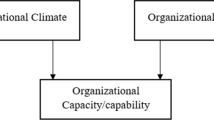Abstract
Big data analytics (BDA) has the potential to provide firms with competitive benefits. Despite its massive potential, the conditions and required complementary resources and capabilities through which firms can gain business value, are by no means clear. Firms cannot ignore the influx of data, mostly unstructured, and will need to invest in BDA increasingly. By doing so, they will have to, e.g., necessitate new specialist competencies, privacy, and regulatory issues as well as other structural and cost considerations. Past research contributions argued for the development of idiosyncratic and difficult to imitate firm capabilities. This study builds upon resources synchronization theories and examines the process to obtain business value from BDA. In this study, we use data from 27 cases studies from different types of industries. Through the coding analyses of interview transcripts, we identify the contingent resources that drive, moderate and condition the value of a BDA capability throughout different phases of adoption. Our results contribute to a better understanding of the importance of BDA resources and the process and working mechanisms through which to leverage them toward business value. We conclude that our synthesized configurational model for BDA capabilities is a useful basis for future research.
Access this chapter
Tax calculation will be finalised at checkout
Purchases are for personal use only
Similar content being viewed by others
Notes
- 1.
As no single person has all the required skills for BDA success, typical assessments should cover skill sets across teams, departments in order to identify possible skill gaps and development needs.
References
Constantiou, I.D., Kallinikos, J.: New games, new rules: big data and the changing context of strategy. J. Inf. Technol. 30(1), 44–57 (2015)
Goes, P.B.: Editor’s comments: big data and IS research. MIS Q. 38(3), p. iii-viii (2014)
Akter, S., et al.: How to improve firm performance using big data analytics capability and business strategy alignment? Int. J. Prod. Econ. 182, 113–131 (2016)
Wamba, S.F., et al.: Big data analytics and firm performance: effects of dynamic capabilities. J. Bus. Res. 70, 356–365 (2017)
McAfee, A., Brynjolfsson, E., Davenport, T.H.: Big data: the management revolution. Harvard Bus. Rev. 90(10), 60–68 (2012)
Van de Wetering, R., Mikalef, P., Pateli, A.: A strategic alignment model for IT flexibility and dynamic capabilities: toward an assessment tool. In: The Proceedings of the Twenty-Fifth European Conference on Information Systems (ECIS), Guimarães, Portugal (2017)
Mikalef, P., et al.: Big data analytics capabilities: a systematic literature review and research agenda. Inf. Syst. e-Bus. Manag. 16, 1–32 (2017)
Grover, V., et al.: Creating strategic business value from big data analytics: a research framework. J. Manag. Inf. Syst. 35(2), 388–423 (2018)
Barney, J.: Firm resources and sustained competitive advantage. J. Manag. 17(1), 99–120 (1991)
Chamberlin, E.H.: Monopolistic or imperfect competition? Q. J. Econ. 51(4), 557–580 (1937)
Makadok, R.: Toward a synthesis of the resource-based and dynamic-capability views of rent creation. Strateg. Manag. J. 22(5), 387–401 (2001)
Amit, R., Schoemaker, P.J.: Strategic assets and organizational rent. Strateg. Manag. J. 14(1), 33–46 (1993)
Pavlou, P.A., El Sawy, O.A.: From IT leveraging competence to competitive advantage in turbulent environments: the case of new product development. Inf. Syst. Res. 17(3), 198–227 (2006)
Ravichandran, T., Lertwongsatien, C.: Effect of information systems resources and capabilities on firm performance: a resource-based perspective. J. Manag. Inf. Syst. 21(4), 237–276 (2005)
Van de Wetering, R., Versendaal, J., Walraven, P.: Examining the relationship between a hospital’s IT infrastructure capability and digital capabilities: a resource-based perspective. In: The Proceedings of the Twenty-Fourth Americas Conference on Information Systems (AMCIS). AIS, New Orleans (2018)
Gantz, J., Reinsel, D.: The digital universe in 2020: big data, bigger digital shadows, and biggest growth in the far east. IDC iView: IDC Anal. Futur. 2012(2007), 1–16 (2012)
Davenport, T.H.: Competing on analytics. Harv. Bus. Rev. 84(1), 98 (2006)
Eisenhardt, K.M., Martin, J.A.: Dynamic capabilities: what are they? Strateg. Manag. J. 21(10–11), 1105–1121 (2000)
Kamioka, T., Tapanainen, T.: Organizational use of big data and competitive advantage-exploration of antecedents. In: PACIS (2014)
Gupta, M., George, J.F.: Toward the development of a big data analytics capability. Inf. Manag. 53(8), 1049–1064 (2016)
Eisenhardt, K.M., Graebner, M.E.: Theory building from cases: opportunities and challenges. Acad. Manag. J. 50(1), 25–32 (2007)
Benbasat, I., Goldstein, D.K., Mead, M.: The case research strategy in studies of information systems. MIS Q. 11(3), 369–386 (1987)
Battistella, C., et al.: Cultivating business model agility through focused capabilities: a multiple case study. J. Bus. Res. 73, 65–82 (2017)
Erevelles, S., Fukawa, N., Swayne, L.: Big data consumer analytics and the transformation of marketing. J. Bus. Res. 69(2), 897–904 (2016)
Janssen, M., van der Voort, H., Wahyudi, A.: Factors influencing big data decision-making quality. J. Bus. Res. 70, 338–345 (2017)
Braganza, A., et al.: Resource management in big data initiatives: processes and dynamic capabilities. J. Bus. Res. 70, 328–337 (2017)
Espinosa, J.A., Armour, F.: The big data analytics gold rush: a research framework for coordination and governance. In: 2016 49th Hawaii International Conference on System Sciences (HICSS). IEEE (2016)
Yin, R.K.: Case Study Research: Design and Methods. SAGE publications, Thousand Oaks (2013)
Miles, M.B., Huberman, A.M.: Qualitative Data Analysis: An Expanded Sourcebook, 2nd edn. SAGE Publications, Thousand Oaks (1994)
Boudreau, M.-C., Gefen, D., Straub, D.W.: Validation in information systems research: a state-of-the-art assessment. MIS Q. 25, 1–16 (2001)
Mikalef, P., van de Wetering, R., Krogstie, J.: Big data enabled organizational transformation: the effect of inertia in adoption and diffusion. In: Abramowicz, W., Paschke, A. (eds.) BIS 2018. LNBIP, vol. 320, pp. 135–147. Springer, Cham (2018). https://doi.org/10.1007/978-3-319-93931-5_10
Mikalef, P., et al.: Information governance in the big data era: aligning organizational capabilities. In: Proceedings of the 51st Hawaii International Conference on System Sciences (2018)
Fiss, P.C.: A set-theoretic approach to organizational configurations. Acad. Manag. Rev. 32(4), 1180–1198 (2007)
Aral, S., Weill, P.: IT assets, organizational capabilities, and firm performance: how resource allocations and organizational differences explain performance variation. Organ. Sci. 18(5), 763–780 (2007)
Van de Wetering, R., Mikalef, P., Helms, R.: Driving organizational sustainability-oriented innovation capabilities: a complex adaptive systems perspective. Curr. Opin. Environ. Sustain. 28, 71–79 (2017)
Acknowledgments
 This project has received funding from the European Union’s Horizon 2020 research and innovation programme, under the Marie Sklodowska-Curie grant agreement No. 704110.
This project has received funding from the European Union’s Horizon 2020 research and innovation programme, under the Marie Sklodowska-Curie grant agreement No. 704110.
Author information
Authors and Affiliations
Corresponding author
Editor information
Editors and Affiliations
Rights and permissions
Copyright information
© 2019 Springer Nature Switzerland AG
About this paper
Cite this paper
van de Wetering, R., Mikalef, P., Krogstie, J. (2019). Big Data is Power: Business Value from a Process Oriented Analytics Capability. In: Abramowicz, W., Paschke, A. (eds) Business Information Systems Workshops. BIS 2018. Lecture Notes in Business Information Processing, vol 339. Springer, Cham. https://doi.org/10.1007/978-3-030-04849-5_41
Download citation
DOI: https://doi.org/10.1007/978-3-030-04849-5_41
Published:
Publisher Name: Springer, Cham
Print ISBN: 978-3-030-04848-8
Online ISBN: 978-3-030-04849-5
eBook Packages: Computer ScienceComputer Science (R0)




